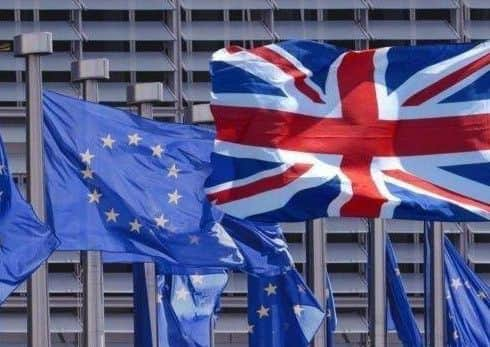Brexit is a complication but it won't decide question of Irish unity
and live on Freeview channel 276
I did know that. I wrote about it at the time. But I also argued that the decision to Remain wouldn’t, in fact, do anything to shut down the demands from Scottish and Irish nationalists for independence and unity.
Sinn Fein, for example, supported the Good Friday Agreement because it viewed it as facilitating a ‘transition phase’ to a united Ireland. The SDLP viewed it as the easiest route to an ‘eventual united and agreed Ireland’.
Advertisement
Hide AdAdvertisement
Hide AdIn other words, a decision by the UK to remain in the EU wouldn’t make a difference to the desire of Irish republicans and nationalists to remove Northern Ireland from the United Kingdom. So while I was aware of potential problems – particularly for small-n nationalists and small-u unionists (the sort of people who could, perhaps, be persuaded to support unity at some point and under some circumstances) – they were outweighed by my certainty that a vote to Remain wouldn’t – couldn’t – shut down the ongoing demand for unity.


I voted No in 1975 because of my concerns that what was still the EEC/Common Market would keep growing and become a new super state. People told me I was wrong. Margaret Thatcher insisted that such a state was not possible. Yet by the time of the 2016 referendum we had a 28-state EU, complete with flag, parliament, president, executive, anthem, single currency (for most members), an agreed foreign policy in all but name, recommendations for an EU armed force and demands for increasing integration.
There was no way I could vote Remain; and anyway, I believe the UK can survive and thrive outside the EU. I don’t regret the decision and would vote the same way in the event of a second referendum – which, as it happens, I still think likely.
I accept that Brexit has raised huge problems for the Irish government. I don’t dismiss their concerns out of hand and I can understand their desire – their need – for a ‘soft’ solution – not simply to the border problem, but also in respect of their ongoing role as co-guarantors of the Good Friday Agreement. That’s why I think it makes sense for Mrs May – supported by the DUP and the EU – to find a way of resolving Irish concerns.
Advertisement
Hide AdAdvertisement
Hide AdLeo Varadkar doesn’t want a united Ireland anytime soon: indeed, with the possible exception of Sinn Fein nobody wants one anytime soon. The Irish government has enough other problems on its plate. Yet in exactly the same way that the Irish government made life very much easier for unionists by agreeing to remove Articles 2 and 3 in 1998, I’m pretty sure the UK government could find an imaginative way of helping the Irish now.


Brussels/London/Dublin/Belfast can surely manage that; a deal which recognises and supports the unique relationship between North/South and East/West without undermining the constitutional integrity of the United Kingdom.
While it is true that Brexit has pushed the unity question to the forefront of political debate it is not true – as Sinn Fein in particular seem to think – that a border poll would deliver unity.
Any debate about the UK versus a united Ireland would obviously be influenced by the shape and outworking of the final Brexit deal, but Brexit won’t, I think, be the deciding issue. A united Ireland requires the formal break-up of the UK, the creation of an entirely new state, a permanent loss of identity for hundreds of thousands of ‘unionists,’ and a negotiation process between London and Dublin that would certainly be difficult and probably protracted.
Advertisement
Hide AdAdvertisement
Hide AdIt also requires a huge debate across the present Republic, centred on whether they even want a unity which delivers upwards of a million people who have no particular desire to be in a new state and whose political influence in the Dail could be both enormous and unsettling. And all this before weighing up the economic consequences of unity!
As I say, I can understand why republicans/nationalists are disconcerted by Brexit (one SDLP MLA described it to me as, “British rule in a new manifestation”) and why small-n nationalists and small-u unionists may feel that they could lose an element of their overall political/cultural identity when the UK leaves the EU. But it doesn’t necessarily follow that fear of losing a part of their identity would encourage those ‘small’ elements to swap their overall pro-UK identity for an entirely new identity.
And it would be a new identity. You can be Irish in Northern Ireland because there is the possibility of NI leaving the UK at some point. But you can’t be British in a united Ireland because the identity can only ever be a memory once Ireland was united. No door will be left open to a second border poll. Unionists wouldn’t be given the sort of veto powers that the majority party of nationalism has in the present NI. There’ll be no mandatory position for unionists in an Irish government. And I’m pretty sure that British governments would not regard it as part of their future responsibility to protect and promote the rights of unionists in a united Ireland. Put bluntly, a British dimension and mandatory power-sharing won’t be part of any deal.
As a unionist I don’t fear a border poll. But, as I noted in last week’s column, I’m not sanguine, either. We have a lot of work to do and a lot of concerns to address and resolve. That must be our priority.